How to Start a Truck Parking Lot Business
In today’s logistics-centered world, the trucking industry is indispensable. With an increase in freight transportation, there’s a growing need for secure and spacious truck parking facilities. Starting a truck parking business can not only meet this demand, but also be a profitable entrepreneurial opportunity.
This article will guide you through the process of setting up your truck parking business, with a special focus on building the perfect parking lot with modern solutions such as TRUEGRID® permeable pavers.
Understanding the Truck Parking Business
The Demand for Truck Parking
Understanding the market demand for truck parking is crucial in shaping your business model. Let’s delve deeper into why there is such a growing demand for this service.
Expansion of the Trucking Industry
As the global economy continues to evolve and expand, so does the trucking industry. Goods need to be transported across states, and trucks are often the chosen mode of transport for long-haul deliveries. More trucks on the roads inevitably lead to an increased demand for truck parking, particularly secure and well-equipped facilities.
Regulatory Requirements for Rest
Truck drivers are bound by regulations, such as the Hours of Service regulations enforced by the Federal Motor Carrier Safety Administration in the U.S., that mandates specific rest periods after a certain amount of driving time. These regulations necessitate truckers to find secure and convenient places to park and rest, which further escalates the need for dedicated truck parking areas.
Security Concerns
Trucks often carry valuable goods, and parking in isolated or poorly secured areas exposes them to risks of theft and damage. There is a demand for secure truck parking facilities where drivers can leave their vehicles without worry.
Lack of Adequate Public Parking Spaces
There are public rest areas along major highways, but they are often insufficient to accommodate the growing number of trucks. They also may lack the necessary security measures and amenities that drivers need during their rest periods, which increases the demand for private, well-equipped truck parking lots.
Parking Requirements of Local Enterprises
Many local firms, which depend on trucks for their transportation and delivery services, encounter space limitations, particularly in urban settings. Most firms do not have sufficient area on their own premises to accommodate these large vehicles and there is a considerable demand for secure, external parking facilities for their truck fleets.
Feasibility Study and Business Plan
Before starting any business, conducting a feasibility study is critical. Understand the local demand, identify your potential competitors, and analyze market trends. Once you have a clear picture of the industry landscape, develop a comprehensive business plan. Your plan should detail your business structure, services, marketing strategies, and financial projections.
Building a Truck Parking Lot
Choosing the Right Location
The success of your business largely depends on its location. You want a place that is accessible and convenient for truck drivers. Proximity to highways, rest areas, and logistics hubs is desirable. Also, ensure the location has enough space to accommodate a sufficient number of trucks, for easy maneuverability.
Legal Requirements and Insurance
Ensure that you obtain the necessary permits and licenses to operate your business. Adhere to zoning regulations and environmental compliance rules. Protect your investment with adequate insurance that covers liabilities such as property damage, vehicle damage, and potential accidents.
Marketing Your Truck Parking Business
Effective marketing can help your business reach potential customers. Establish a strong online presence with a user-friendly website and active social media engagement. Traditional marketing methods like print ads and local partnerships can also be beneficial.
Selecting the Right Materials: The Case for Permeable Pavers
When constructing your parking lot, material selection is the key. Traditional materials like asphalt and concrete are prone to cracks and potholes, and require frequent maintenance. TRUEGRID® permeable pavers, on the other hand, are a modern, durable, and low-maintenance solution.
TRUEGRID® PRO PLUS®
TRUEGRID® pavers are perfect for a truck parking lot because they’re made from 100% recycled high-density polyethylene, and can handle heavy loads. They’re designed to be permeable, which allows for natural water filtration and eliminates the need for separate stormwater management systems.
TRUEGRID® PRO PLUS® is the commercial paver preferred by engineers for complete pervious cover, detention, and stormwater management. It’s a trusted choice that has been used in millions of square feet of heavy-use commercial parking lots. Plus, they’re easy to install and require little maintenance. Stone filled PRO PLUS can withstand unlimited frequency, heavy load traffic.
Eco-Friendly Parking with Grass-Filled Pavers
TRUEGRID® PRO PLUS® can also be used with a soil and grass infill for a 100% turf grass covered areas for low-use driveways, fire lanes & emergency access, and access roads, and it provides an innovative, cool solution for parking surfaces. This secondary installation method has its foremost advantage is its aesthetic. TRUEGRID® PRO PLUS® pavers protect grass roots from compaction and will remain rut and mud free for over 60 years of pavement use.
Along with its ease of installation, the TRUEGRID® PRO LITE® paver excels in its commitment to the environment. It is constructed from 100% post-consumer recycled high-density polyethylene (HDPE), to help reinforce its eco-friendly nature. It also promotes natural water infiltration, to help reduce the risk of surface runoff and flooding, cools the air, while also protecting local ecosystems.
Its benefits include:
- Allows for natural grass growth and 100% grass coverage
- Contributes to a visually pleasing and heat-reducing greenscape
- Durability and low-maintenance requirements of the PRO PLUS® with grass infill permeable paver enhances its appeal
- Cost-effective and sustainable choice for parking lots and driveways
TRUEGRID® Pavers: The Perfect Solution for Your Truck Parking Business
TRUEGRID® pavers are the perfect solution for all of your truck parking business needs. Providing superior durability, longevity, and safety due to their 100% recycled high-density polyethylene construction, TRUEGRID® Permeable Pavers are the ideal choice for any parking lot or driveway. The easy installation also makes them a cost-effective option, which eliminates the need for specialized labor or heavy machinery.
TRUEGRID® Permeable Pavers are an eco-friendly solution that reduces surface runoff and flooding while preserving local ecosystems.
Contact us today for more information and a free quote!
Driveway fabric has become a popular solution for protecting gravel driveways from issues such as sinking, shifting, and weed growth. However, driveway fabric isn’t flawless and it has its own set of problems. Understanding the concerns is the key to making an informed decision about your driveway’s durability and aesthetics.
Understanding Driveway Fabric: A Brief Overview
To better understand the problems associated with driveway fabric, it’s important to first familiarize ourselves with what driveway fabric is and how it works. Driveway fabric, also known as geotextile fabric or landscape fabric, is a synthetic material designed to provide stability and longevity to a gravel driveway.
The Function of Driveway Fabric
The driveway fabric serves as a barrier between the gravel layer and the underlying soil. When installed, the fabric is unrolled onto the excavated driveway area, and then covered with gravel. This method aims to solve two main problems inherent in traditional gravel driveways:
Prevention of Inter-mixing
The primary purpose of driveway fabric is to prevent the gravel and the underlying soil from intermixing. In traditional gravel driveways without fabric, the weight of vehicles can push the gravel into the softer subsoil. This can cause the gravel to sink which makes the driveway uneven and in need of regular re-graveling. By providing a barrier, the fabric helps keep the gravel layer separate and intact.
Weed Control
Driveway fabric also functions as a weed barrier. Weeds can be a significant problem in gravel driveways because they can grow through the spaces between the gravel. The fabric prevents weeds from emerging through the gravel by providing a physical barrier.
The Installation Process
The installation of driveway fabric requires careful planning and labor:
- After excavating the driveway area, contractors must ensure the ground is even and free from sharp objects that might tear the fabric.
- Roll the fabric out on the driveway.
- Add the gravel layer.
It’s important to ensure that a sufficient depth of gravel is maintained above the fabric. Too little gravel can result in exposure of the fabric to UV rays, which can degrade it over time. Conversely, too much gravel can make it difficult for the fabric to function effectively as a weed barrier.
The Downside to Driveway Fabric
Despite the fabric’s benefits in maintaining the structural integrity of the driveway and controlling weed growth, the system is not without its limitations. Issues can start appearing over time, ranging from gravel loss and water drainage problems to durability concerns – all of which are critical factors for any homeowner to consider when choosing the right driveway solution.
However, there are several drawbacks to using driveway fabric:
Loose Gravel
The gravel on driveway fabric is loose, which can lead to shifting and scattering over time. It can result in an uneven surface and potential loss of gravel, and may require additional maintenance and regular replenishment.
Surface Water Drainage
Depending on the type and manufacturer, driveway fabric is not always a permeable solution. It can prevent soil erosion to some extent, but surface water can’t drain through the fabric. This can lead to water pooling on the driveway surface, which can cause potential damage and slipping hazards.
Durability Concerns
Driveway fabric can tear during installation, especially on uneven ground or areas with sharp rocks. Once damaged, the fabric can lose its effectiveness, which can lead to sinking and shifting of the gravel.
Despite its popularity, the downsides of driveway fabric highlight the need for a more robust and efficient solution. TRUEGRID® permeable pavers easily provide significant advantages over driveway fabric.
TRUEGRID® Permeable Pavers: A Superior Solution

The TRUEGRID® permeable paver system is a more efficient, eco-friendly, and durable solution to using traditional driveway fabric alone. TRUEGRID® Permeable Pavers are a grid structure that holds the gravel in place to ensure a smooth and even surface.
Why Choose TRUEGRID®?
Stable Gravel
Unlike driveway fabric, the gravel in TRUEGRID® pavers stays locked in place within the grid structure. This prevents shifting or scattering, which reduces maintenance requirements and provides a consistently smooth surface.
Excellent Water Drainage
TRUEGRID® pavers are permeable, which allows surface water to drain directly through the system and into the ground below. This effectively prevents water pooling, to help reduce slip hazards and potential driveway damage.
High Durability
Made from 100% recycled plastic, TRUEGRID® pavers are highly durable and resistant to cracking or breaking, even under heavy loads. The interlocking system also allows for easy installation on any ground surface, which reduces the risk of damage during the installation process.
TRUEGRID® Offers Two Solutions That Work with Gravel
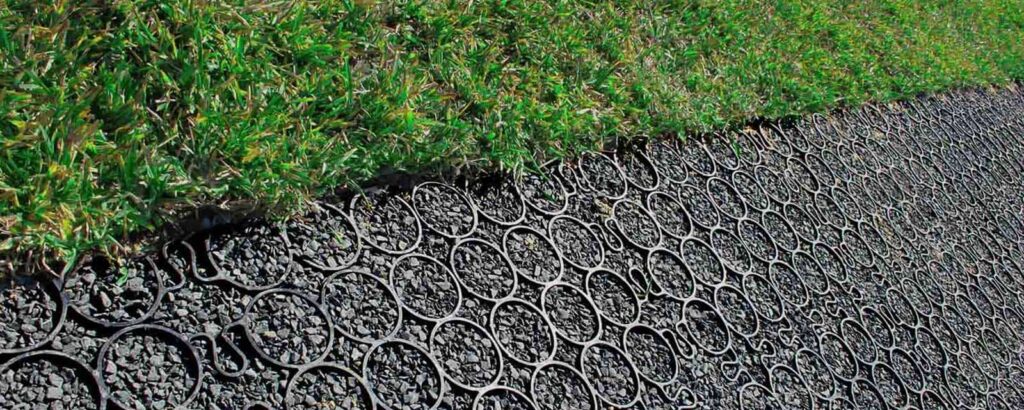
TRUEGRID® PRO LITE® – A Great Fit for Light Commercial and Residential Use
TRUEGRID® PRO LITE® is a specialized permeable paver that has been engineered to be porous while also able to withstand medium vehicular weights and traffic, to help ensure safety for both pedestrians and cyclists. It is built for durability and has a green-friendly design with superior compression resilience and adaptability.
The PRO LITE® paving option is a tough paver that provides a cost-efficient solution, which makes it a superb selection for gravel or grass-based overflow parking spaces, driveways, fire access lanes, and a variety of other paving needs.
TRUEGRID® PRO PLUS® – For Commercial Traffic
In the realm of paving, TRUEGRID® PRO PLUS® stands out as the best permeable paver for commercial use. It’s the preferred choice among engineers due to its full permeable surface, and it is capable of effectively handling stormwater and water detention.
With a proven track record in covering millions of square feet in high-traffic commercial parking zones, its reliability is unquestionable. Its ease of installation and almost zero maintenance add to its appeal. The PRO PLUS® paver is also fully compatible with all accessories under the TRUEGRID® brand, including the SuperSpot® parking markers.
Introducing TRUEGRID® Grass Permeable Pavers

In addition to traditional permeable pavers, TRUEGRID® also offers grass permeable pavers. TRUEGRID ROOT™ grass permeable pavers have several benefits:
Eco-friendly
Grass permeable pavers contribute to a greener environment by reducing stormwater runoff and promoting natural groundwater replenishment. They also absorb carbon dioxide and produce oxygen to enhance air quality.
Heat Reduction
Unlike traditional pavement or concrete, grass permeable pavers help reduce the urban heat island effect by maintaining a cooler surface temperature.
Aesthetics
Grass permeable pavers provide an attractive, natural look for driveways, parking lots, and outdoor spaces, and can easily blend seamlessly with the surrounding landscaping.
Low-Maintenance
TRUEGRID® permeable pavers are designed for longevity and resilience. They require minimal maintenance compared to traditional grass lawns, which can be prone to patchiness, weeds, and damage from traffic.
The potential applications for this product are extensive, from residential driveways to commercial parking lots, fire lanes, and more.
Upgrade Your Driveway with TRUEGRID® Pavers: A Superior Alternative to Driveway Fabric
Don’t let your driveway be a source of worry and hassle. Upgrade to TRUEGRID® permeable pavers for a superior alternative to driveway fabric alone. TRUEGRID® Permeable Pavers give you the option to lock in the gravel, or allow the grass to keep growing, all while providing enhanced water drainage capabilities, and unrivaled durability.
Contact us today for more information and a free quote!
When it comes to developing a new parking lot, finding the right contractor is the key factor to ensure quality, efficiency, and adherence to your project’s specific needs.

This article covers seven essential tips to help you select the most suitable parking lot contractor for your project. We will also introduce TRUEGRID®, an innovative solution for modern, eco-friendly, and durable parking lot construction.
1. Research and Recommendations
The initial stage in your search for a reliable parking lot contractor should be conducting comprehensive research and gathering trustworthy recommendations.
Online Research
A simple internet search can reveal a list of potential contractors in your area. Take note of those with professional websites, as these platforms often reflect the level of professionalism and investment a contractor puts into their business.
Examine the services they offer, their past projects, and any client testimonials that are available. It can also be helpful to check their social media platforms and online directories for more insights into their work.
Recommendations
Word-of-mouth recommendations are another powerful tool in your search. Speak to colleagues, family, friends, or anyone who has recently completed a similar project. Their experiences can provide valuable insights into the reliability, quality, and professionalism of potential contractors.
Reviews and Testimonials
Examine online reviews and testimonials from previous clients. They may offer an honest appraisal of a contractor’s work and can alert you to potential issues or points of praise. Websites like Google Reviews, Angie’s List, or the Better Business Bureau can be good sources of independent reviews.
Professional Rankings and Awards
Consider checking professional rankings and awards in the industry. They can be found on industry-related websites and can give you an idea of who the leaders are in the field.
Remember, thorough research and valuable recommendations can significantly help you narrow down your options in order to select a parking lot contractor who will best meet your project’s specific needs. Ultimately, the goal is to find a contractor who is reputable, reliable, and well-suited to fulfill your parking lot construction objectives.
2. Experience and Expertise
When evaluating potential contractors for your parking lot project, assessing their experience and expertise is critical. This combination of attributes provides a solid foundation for quality construction and successful project outcomes.
Years in the Business
Although the length of time a contractor has been operating doesn’t directly ensure excellent craftsmanship, it can offer a glimpse into the firm’s strength in the marketplace. A business that has managed to thrive over an extended period in the intensely competitive building sector probably has a history of providing satisfactory outcomes.
Portfolio of Work
A reliable contractor will have a detailed record of the work they’ve done before. By looking at past projects that are similar to yours, you can understand the contractor’s skills and the standard of their work. It also helps you see how well they adjust to and handle different project needs.
Specialized Expertise
In an era where environmental considerations are important during construction, specialized expertise in using modern, eco-friendly materials like permeable pavers is a significant advantage. Many municipalities and regulatory agencies now require all or a portion of parking on a site to be permeable.
Training and Continual Learning
The construction industry continually evolves with new technologies, materials, and best practices. It’s important to select a contractor that values ongoing training and learning. A commitment to staying updated demonstrates a proactive approach to providing the best service and solutions to clients.
3. Licensing, Insurance, and Certification
Ensuring that your potential contractor is properly licensed, insured, and certified is not just a precautionary step; it’s a necessity that helps safeguard your investment and minimizes potential legal and financial risks.
Licensing
Contractors must be licensed to perform construction work in your specific region. Licensing indicates that they have met the state or local government’s standards for conducting business and performing construction tasks. It also ensures that the contractor is aware of and will adhere to the local building codes and regulations, which are essential for your project’s legality and safety.
Insurance
An adequately insured contractor protects you from liability if an accident or property damage occurs during the project. Two types of insurance are essential: liability insurance and workers’ compensation. Liability insurance covers any damages to your property caused by the contractor during the construction process. Workers’ compensation covers the contractor’s employees in case of work-related injuries, and prevents you from being held financially responsible.
4. Consideration of Environmental Impact
In the modern construction industry, environmental considerations are increasingly important. As you select a parking lot contractor, their commitment to eco-friendly practices should be a significant factor in your decision-making process.
Green Materials
Contractors who prioritize sustainability will often advocate for the use of environmentally-friendly materials like TRUEGRID® permeable pavers. Unlike traditional asphalt or concrete, permeable pavers reduce runoff, prevent erosion, and promote natural water filtration to contribute to the overall health of local water systems, and the broader environment.
Eco-friendly Design
A contractor who cares about the environment will think about how the parking lot design affects nature. They will consider things like how rainwater drains naturally, how the soil can be protected from erosion, and how to preserve the local plants and animals. A well-planned parking lot can fit in well with the environment around it, to cause less harm and help local plant and animal life.
Grass Stabilizing TRUEGRID® ROOT® Pavers
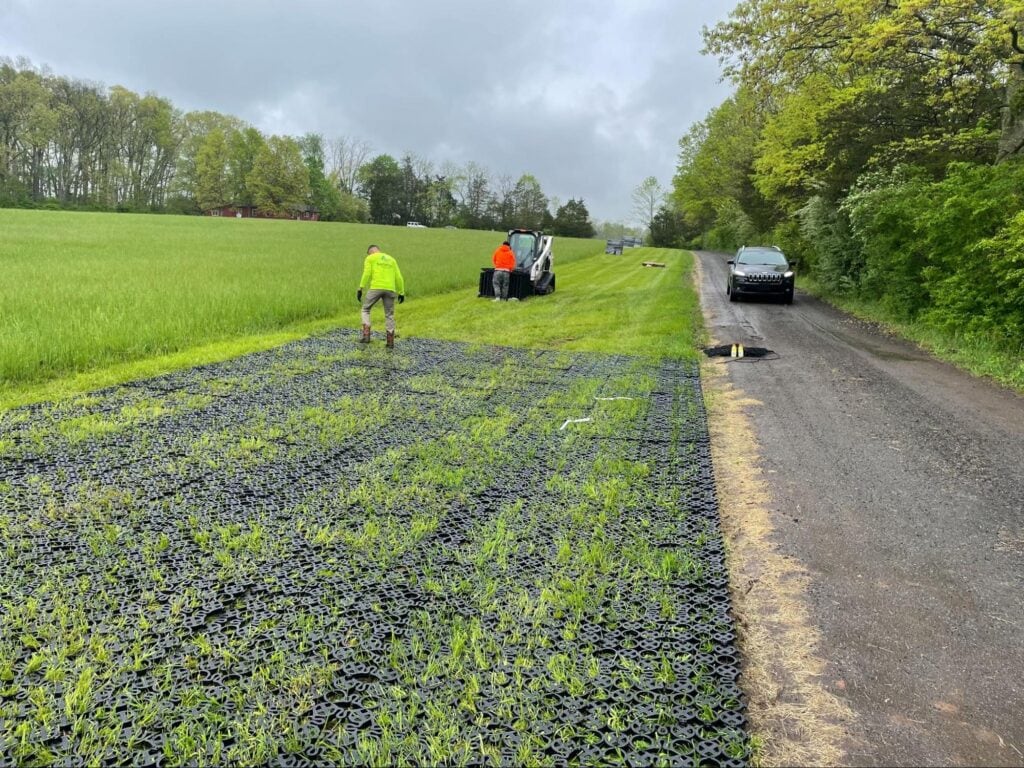
TRUEGRID® ROOT® pavers can be placed on existing grass, in order to create a parking lot that blends into the natural landscape while also being functional. This approach encourages urban greening efforts, to increase the aesthetic appeal of the parking lot and also support local ecosystems.
Long-term Environmental Impact
Selecting a contractor who prioritizes environmental considerations is not only beneficial to the planet, but it can also positively impact your project. Eco-friendly designs and materials can improve the aesthetic and functional aspects of your parking lot, by providing a solution that satisfies both your immediate needs and long-term sustainability goals.
5. Comprehensive Services
When selecting a parking lot contractor, you need someone who can manage all aspects of the project, from initial consultation and planning to construction and maintenance. A contractor that offers comprehensive services can streamline the process, which makes it easier and more efficient for you.
Initial Consultation and Site Inspection
The contractor should offer an initial consultation to understand your project requirements, budget, and timeline. They should conduct a thorough site inspection in order to assess the condition of the area and identify any potential challenges.
Design and Planning
A top-notch contractor will have skilled designers and engineers that can create a functional and aesthetically pleasing parking lot design. They should take into account various factors such as traffic flow, parking space requirements, and environmental considerations.
Construction
The contractor should have a team of experienced builders who can execute the construction plan efficiently and accurately. They should adhere to the agreed-upon timeline and maintain open communication to keep you updated on the project’s progress.
Maintenance and Aftercare
Post-construction, the contractor should offer maintenance services to ensure the longevity of your parking lot. This could include regular sweeping and inspections as well as necessary repairs or replacements.
Additional Services
A full-service contractor may also provide additional services such as landscaping or installing signage and lighting, to give you a turnkey solution for your parking lot project.
6. Transparent Quote/Estimate
Transparency in quoting project costs is a hallmark of a trustworthy and reliable contractor. When considering a parking lot contractor, their willingness and ability to provide a clear, detailed, and accurate quote should be a determining factor.
Detailed Breakdown
A professional quote will include a detailed breakdown of all projected costs. It should cover material costs, labor charges, any potential charges for machinery use, and any other costs that might be incurred during the project. This type of detail allows you to understand where your money is going and can help prevent disputes down the line.
No Hidden Charges
Trustworthy contractors won’t bury hidden fees in their contracts. Everything should be explicitly stated in the quotation.
Willingness to Discuss
A contractor should be willing to discuss their quote with you in detail, and answer any questions you might have and clarify any parts of the quote that you’re unsure about.
Incorporation of High-Quality Materials
The quote should also reflect the use of high-quality materials. They might drive the cost up compared to lower-quality alternatives, but they will provide better value in the long run due to durability and longevity.
7. Warranty and Post-Construction Services
A professional parking lot contractor will stand by the quality of their work by offering a warranty. Post-construction services, such as routine inspections and maintenance, are essential for ensuring the longevity of your parking lot.
Get Eco-Friendly, Durable Results with TRUEGRID® Permeable Paving Solutions
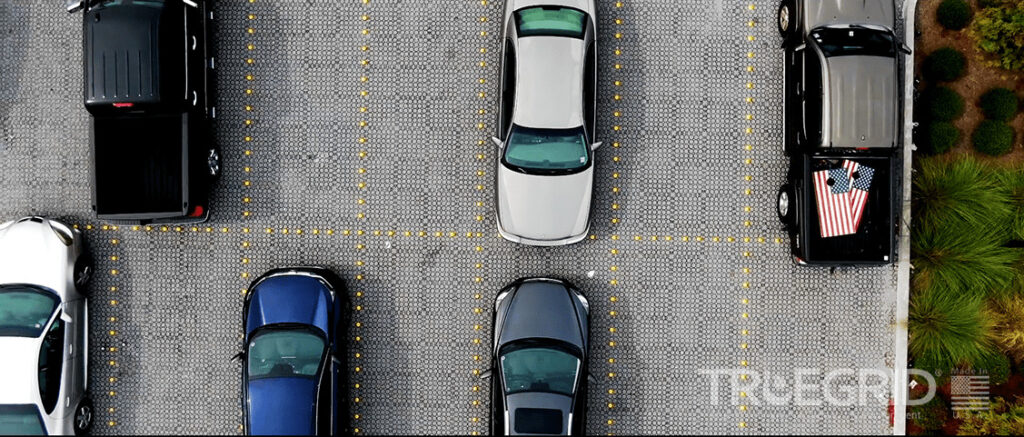
When choosing parking lot or driveway solutions, TRUEGRID® should be at the top of your list for their commitment to eco-friendly practices and reliable products.
Our innovative permeable pavers are designed to reduce runoff, prevent erosion, and promote natural water filtration. The TRUEGRID® PRO PLUS® system is perfect for creating a parking lot that blends with the natural landscape while still maintaining its functionality.
Contact us today to find out how we can help!
In the world of property management and development, understanding parking ratios and how to calculate them is fundamental. Whether it’s for a commercial building or a residential area, parking ratios can significantly influence both design and capacity.

This guide will delve into how to calculate parking ratios, discuss parking lot design and maintenance, and introduce TRUEGRID® permeable pavers, an innovative, eco-friendly solution for modern parking lots.
Understanding Parking Ratios
Parking ratios are an important framework for designating the number of parking spaces required per unit or per square footage in a given area. They provide a standard measure that allows for uniformity and consistency across various types of establishments, whether residential, commercial, or public facilities.
How to Calculate Parking Ratios
To calculate a parking ratio, you will need to divide the total number of parking spaces by the square footage of the building. For instance, if you have a commercial building with 20 parking spaces and a total of 10,000 square feet, the parking ratio would be calculated as follows:
Number of Parking Spaces / Total Square Feet = Parking Ratio
In this case, the calculation would yield a parking ratio of 2 spaces per 1,000 square feet. Most commercial parking spaces (or bays) are about 200 square feet, on average, in North America.
This standard measure helps to ensure that sufficient parking is available for the estimated usage of the facility.
The Role of Parking Lot Design
In designing parking lots, consideration must be given not only to capacity but also to maintenance and environmental impact. Traditional parking lot materials, such as concrete and asphalt pose certain challenges. They require regular upkeep, are prone to cracking and damage, and create runoff issues due to their non-permeable nature.
The Drawbacks of Traditional Parking Lot Materials
Concrete and asphalt have long been the materials of choice for constructing parking lots. While they serve the purpose of providing a hard surface for vehicles, there are notable challenges associated with these traditional materials:
1. Maintenance and Durability
Due to their inherent characteristics, concrete and asphalt gradually degrade over time. This leads to the formation of cracks and potholes, a problem amplified in regions subject to cyclical freezing and thawing conditions. This deterioration compromises not only the aesthetic integrity of the parking lot, but also poses potential safety risks to both vehicular and pedestrian traffic.
2. Impermeability and Runoff
Concrete and asphalt are both impermeable, meaning they do not allow water to seep through their surface. When it rains, water can’t infiltrate the surfaces, and instead becomes runoff. This can lead to several problems:
- Stormwater Management Issues: Increased runoff can strain municipal stormwater systems, which can lead to overflow and potential flooding.
- Pollution: Runoff can pick up contaminants like oil and chemicals from the parking surface, and carry the pollutants into local waterways.
- Heat Island Effect: Concrete and asphalt absorb heat, which causes urban areas to become significantly warmer than surrounding rural areas. This phenomenon is known as the urban heat island effect.
3. Lack of Aesthetic Appeal
Concrete and asphalt parking lots, due to their monotone gray or black surfaces, often lack aesthetic appeal. It may not be a concern for purely functional spaces, but for residential complexes, businesses, and public spaces looking to maintain a visually pleasing environment, it can be a disadvantage.
4. Periodic Repainting and Re-Striping
The painted lines for parking bays on concrete and asphalt need to be re-done at least every 5 years. However, in harsh weather areas, re-striping is recommended every 12 to 24 months. This means restricting access to the parking lot for hours or days for the scheduled maintenance.
By considering these types of challenges, it becomes clear that alternative solutions like TRUEGRID® permeable pavers are a more durable, eco-friendly, and visually appealing solution for parking lot construction.
The TRUEGRID® Solution
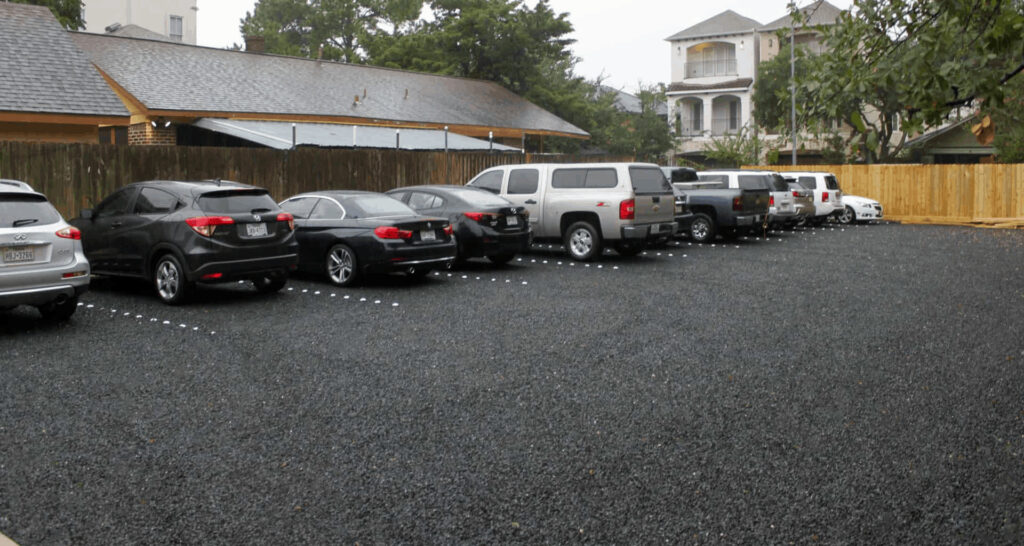
TRUEGRID® permeable pavers are a revolutionary approach to parking lot construction and design. Here are some of the key advantages of TRUEGRID® permeable pavers:
- Durability and Low Maintenance: Unlike traditional materials, TRUEGRID® pavers are highly durable and require minimal maintenance, which makes them a cost-effective choice in the long run.
- Environmentally-Friendly: TRUEGRID® pavers are permeable, which means they allow water to pass through, which reduces issues related to stormwater runoff. This design contributes positively to flood control and groundwater recharge.
- Aesthetic Versatility: Parking lots don’t have to be drab expanses of concrete or asphalt. They can be filled with a variety of materials, with the TRUEGRID® pavers, even grass, to create a visually pleasing and eco-friendly solution.
Embracing Eco-friendly Solutions with TRUEGRID®
As we move toward more sustainable practices in various fields, the construction industry has not been left behind. Integrating eco-friendly solutions like TRUEGRID® permeable pavers, especially when combined with grass, can significantly contribute to an environmentally-conscious approach in parking lot construction.
1. Enhanced Stormwater Management
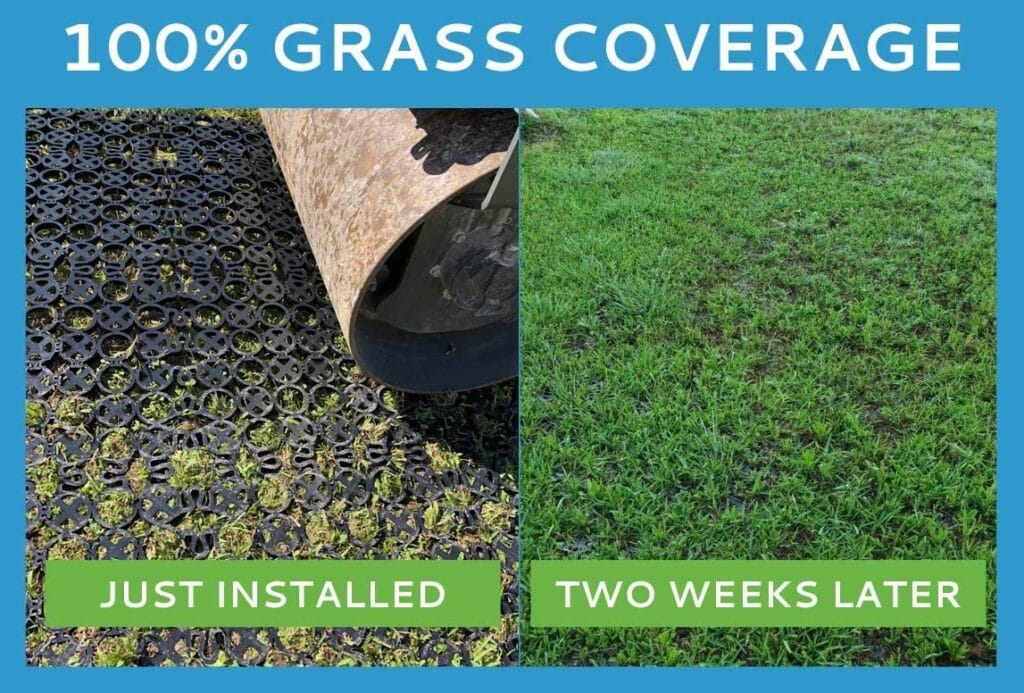
Existing grass stabilizing TRUEGRID® ROOT® Pavers facilitate natural water infiltration. Unlike concrete and asphalt that lead to runoff, these pavers allow water to permeate through the grass and into the ground. TRUEGRID® permeable pavers support efficient stormwater management by reducing the burden on municipal drainage systems and decreasing the risk of flooding.
2. Support for Local Ecosystems
Grass infill and gravel infill in permeable parking lots is more than just an aesthetic feature; it also plays an essential role in supporting the local ecosystem. Grass and soil serve as natural filters, by trapping pollutants and preventing them from entering waterways. In addition, grassy areas can provide habitat for beneficial insects to help contribute to local biodiversity.
3. Natural Cooling and Carbon Sequestration
Unlike asphalt or concrete, grass does not absorb heat. Instead, it helps cool the surroundings, to help mitigate the urban heat island effect commonly caused by traditional parking lots. Grass also absorbs carbon dioxide from the atmosphere in order to help offset greenhouse gas emissions—a process known as carbon sequestration.
4. Aesthetic Appeal and User Experience
Beyond their ecological benefits, gravel-filled or grass-filled TRUEGRID PRO PLUS ® permeable pavers significantly enhance the aesthetic appeal of parking lots. The integration of green spaces into otherwise gray and lifeless areas can dramatically improve the look and feel of the environment, in order to provide a positive experience.
By utilizing TRUEGRID® permeable pavers filled with gravel or grass, developers and property managers can create functional, beautiful, and environmentally-responsible parking solutions, which demonstrates a commitment to sustainability without compromising on the essential requirements of parking lot design.

5. SuperSpot® and SnowSpot Delineators
TRUEGRID® has PRO PLUS® insets called SuperSpot®s and SnowSpots for easy parking delineation. Simply place the “spot” in an empty grid cell in place of painted stripes. TRUEGRID®’s delineators will last the life of the parking lot with no need for replacement or maintenance. SuperSpot®s are raised above the grid for use in warm climates or for high-visibility. SnowSpots, when installed, are flush level with the top of the PRO PLUS® and can be used in cold climates where snow plowing is common. Any number of custom markings or numbering can be accomplished with the spots.
Meet Your Parking Ratio Requirements with TRUEGRID® Solutions
TRUEGRID® is a leading provider of permeable pavers that offer durable, low-maintenance, and eco-friendly solutions for parking lot construction. Our innovative pavers enable developers and property managers to meet their parking ratio requirements while enjoying the benefits of a green parking lot, and an aesthetically pleasing environment.
For more information on how TRUEGRID® can help you create an eco-friendly parking lot, contact us today!

